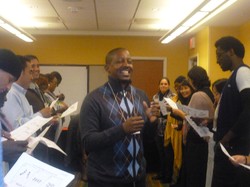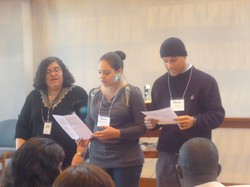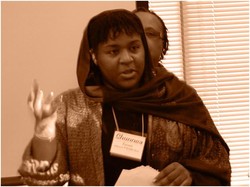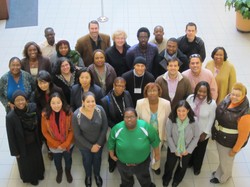If only for a long weekend, 22 racial ethnic seminarians from across the Presbyterian Church (U.S.A.) experienced a foretaste of the “multitude from every nation, tribe, people and language” envisioned by John in the Book of Revelation.
“I thank God that this gathering is what Christ’s church could — and should — look like,” said Linda Valentine, executive director of the General Assembly Mission Council, in addressing the participants and the leadership of the 34th Annual Racial Ethnic Seminarians Conference, which met here from November 10–13.
The conference — which has been sponsored continuously for the past 34 years by the General Assembly Mission Council (GAMC) and in the past four years jointly with the Office of the General Assembly (OGA) — annually invites up to two students from each of the 10 Presbyterian theological institutions and two Presbyterian-related seminaries. These students gain an opportunity to build a support base, to learn how to meet the national and regional requirements of the preparation for ministry process, to be introduced to key denominational leaders and the ministries they represent, to share learning and experiences from seminary life, and to maintain an informed sensitivity to racial ethnic issues and concerns in the church.
All conference expenses — including transportation, room and board — are covered in full for each seminarian through the Sidney and Lillian Harris Fund and an Extra Commitment Opportunity, which is open to ongoing gifts.

Byron Wade leads conference participants in community building activities. —Photo by Emily Odom.
“I agreed to be part of the leadership of the conference because I’m a racial ethnic,” said the Rev. Byron Wade, pastor of the Davie Street Presbyterian Church in Raleigh, N.C., “but also because I know it’s important for other racial ethnics to have some type of support and mentoring so that they can learn some of the pitfalls and also some of the hopes as they go into ministry.”
Leading the participants in the opening community-building exercises on November 10, Wade created a climate in which cross cultural networking and trust could be encouraged and John’s vision — which served as the conference’s theme — could be embodied.
Noris Hilda Marchand-Juan, a junior at Princeton Theological Seminary and an inquirer under care of West Jersey Presbytery, said that she came to the conference with an open mind and with no idea what to expect. “Not only is this my first time in Louisville, this is my first conference ever,” she said. “I came in hopeful to learn about how to provide an environment where multiculturalism is embraced in the church.”
The annual conference — which was held in Louisville for the first time this year — is resourced and staffed by Jewel McRae, associate for Racial Ethnic Referrals & Matching in the PC(USA)’s Church Leadership Connection office, who also led several sessions during the four-day gathering.
In her opening greetings on November 10, McRae told the participants that the leadership team and denominational staff members were all there to serve the seminarians’ needs and to hear their concerns. “We are here for you,” she said. “This is your conference and we want you to benefit wholeheartedly from it. It is our hope that you will leave here Spirit-filled, renewed, and inspired to pursue your call to ministry with passion and commitment.”

Marissa Galvan-Valle, Noris Hilda Marchand-Juan and Mario Amaro lead mid-day worship on November 11. —Photo by Emily Odom.
In addition to McRae and Wade, the conference leadership team — which offered a variety of informational sessions both individually and collectively — included the Rev. Dr. K. Nicholas Yoda, pastor/head of staff at Pleasant Ridge Presbyterian Church in Cincinnati, Oh.; the Rev. Marissa Galvan-Valle, associate, Hispanic Resources and Relationships, Congregational Ministries Publishing of the GAMC; and the Rev. Dr. Tim Cargal, associate for Preparation for Ministry/Examinations in the PC(USA)’s Office of Vocation.
The leadership team was selected to represent and incorporate a diversity of backgrounds and perspectives in order to most effectively design the conference for its Hispanic/Latino, African-American, Asian and new-immigrant participants.
Worship — always the centerpiece of the annual conference — was planned and celebrated throughout the gathering by each of the racial ethnic groups in order to lift up their respective traditions and customs. This year, participants requested at the outset that at least one of the worship planning groups be multicultural.
Jeffrey Cobbold, a junior at Princeton Theological Seminary whose musical gifts may lead him into a tentmaking ministry, affirmed the importance of diverse expressions of worship. “I came to experience new people and to hear what other people think about worship,” he said.
Following powerful morning worship led by African-American seminarians on November 11, a midday prayer service was later led both by conference leaders and participants. Galvan-Valle delivered the message on the conference theme from Revelation 7:9-10.

Shunnea Turner, a senior at Johnson C. Smith Theological Seminary, leads in the traditional African practice of Libations during the November 11 worship led by African-American seminarians. —Photo by Nicholas Yoda.
Describing the vision that God gave to John in Revelation, of a multitude “from every nation, tribe, people and language” praising God, Galvan-Valle said, “As I looked at this passage again, I wondered if English would be the only language used to praise God. I wondered if some loud voice or voices were saying, ‘La salvación pertenece a nuestro Dios, que está sentado en el trono, y al Cordero.’ I wondered if that would be the case if all of these voices together in different languages are the ones that are singing and we miss it because we usually read the Bible in English or in Spanish or in Portuguese or in any other language and we stick to that and we don’t listen to other voices.”
Among the members of the leadership team with whom that observation resonated was Yoda, who described his own experience — including racial bias — as a Japanese-American.
“In my own congregation, I had a member come up to me and say, ‘I am so glad you speak English,’” Yoda said. “At my candidating sermon there was a person who asked another church member, ‘Will he be preaching in English?’ Her fears came from a deep wound from World War II.”
Yoda acknowledged that his formative experiences might be different from the other members of the conference since he grew up in a “very large, connected, Southern Presbyterian church.”
“Many of today’s racial ethnic seminarians are facing language barriers,” he said. “There are also vocational issues with churches in that many are not willing to call first-time seminary graduates. There is a world of things working against them in the system, including gender and racial ethnic bias.”
In explaining that the act of discernment involves both an individual and a community component, Yoda affirmed the conference as a “safe space to explore how these two very important pieces go together” and a great example of the connectional church.
In her presentation on November 11, the Rev. Dr. Marcia Myers, director of the Office of Vocation, described some of the new leadership initiatives of a highly connectional church. “The world is changing a great deal,” Myers said. “Because the needs of people in the world and the needs of our churches are not the same as they were in the 1950s, we need different kinds of leaders.”
Adding his own insights to the church’s changing leadership needs, the Rev. Philip Lotspeich, coordinator of Church Growth for the GAMC’s Evangelism and Church Growth ministry area, addressed the group by saying, “You are my hope. We are looking for new, energetic, entrepreneurial, take-charge people to get out there and take on that challenge.”

